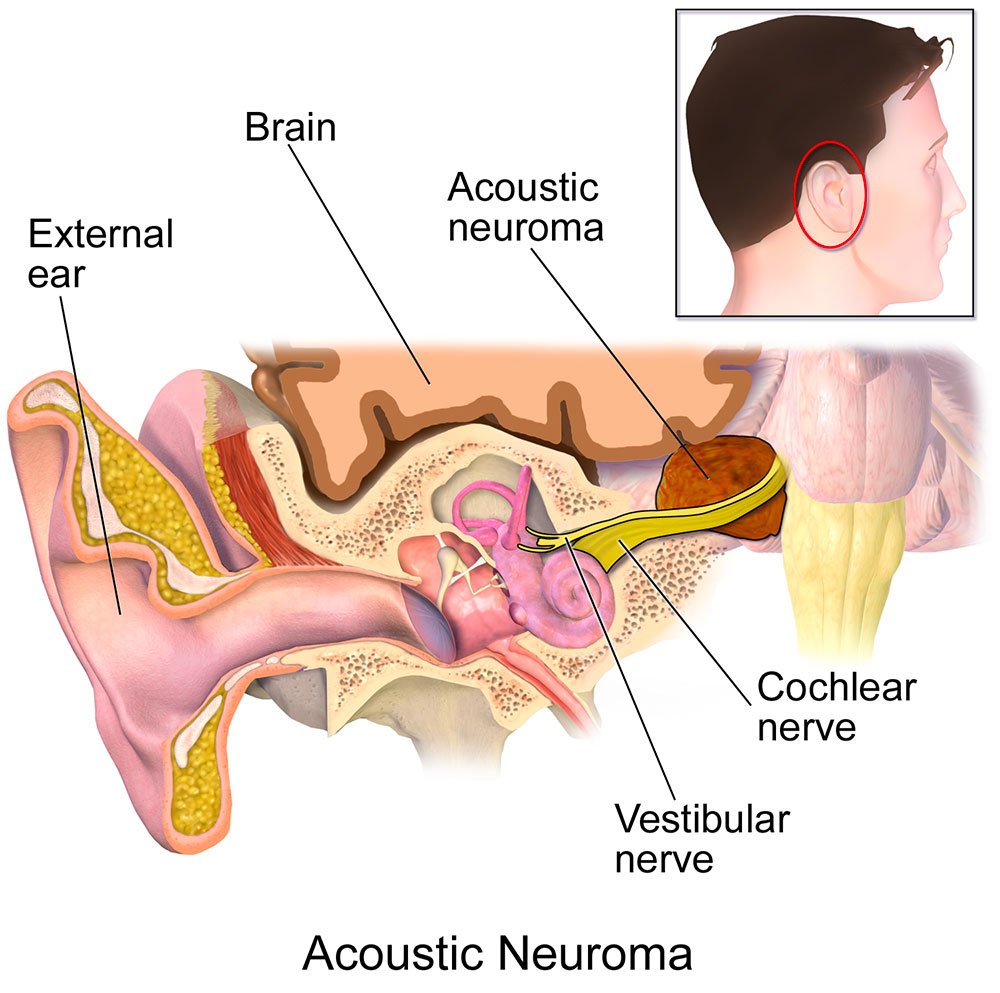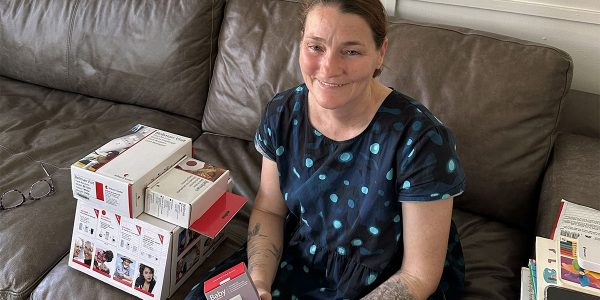Acoustic Neuromas: What You Need to Know

Acoustic neuromas are estimated to affect about 1 in 100,000 people in the general population, and more than 300 Australians are diagnosed with acoustic neuroma every year.
We look at:
- What an acoustic neuroma is
- Symptoms of acoustic neuromas
- Diagnosis
- Treatment options
- After treatment
- Ongoing prognosis
- Where to find support
- Where to get more information
What is an Acoustic Neuroma?
Acoustic neuromas are non-cancerous, slow-growing tumours that develop on the vestibulocochlear nerve, which connects the inner ear to the brain.
An acoustic neuroma is a tumour that originates from the Schwann cells (a type of cell that surrounds neurons) that wrap around the vestibulocochlear nerve.
Due to their origin, these kinds of tumours are also called vestibular schwannomas.
Acoustic neuromas usually develop on the nerve responsible for balance (vestibular nerve) and hearing (cochlear nerve).
They are benign tumours (non-cancerous), meaning they do not spread to other parts of the body, but they can cause a range of symptoms and complications, including hearing loss.

Image: Blausen.com staff (2014). “Medical Gallery of Blausen Medical 2014“. WikiJournal of Medicine 1 (2). DOI:10.15347/wjm/2014.010. ISSN 2002-4436.
Symptoms of Acoustic Neuromas
The symptoms of acoustic neuromas will vary and depend significantly on the tumour’s size and location.
Symptoms can include:
- Hearing Loss: Typically occurring over months to years; in rare cases, it can be sudden and usually affects one side more severely.
- Tinnitus: Characterised by ringing in the affected ear.
- Imbalance: A sense of unsteadiness.
- Dizziness.
- Facial Numbness: In extremely rare instances, weakness or loss of muscle movement.
- Persistent Headaches: Particularly if associated with other symptoms.
- Swallowing Problems: From the tumour pressing on the vagal and hypoglossal nerves.
Diagnosing Acoustic Neuromas
Early detection and diagnosis of acoustic neuromas are crucial for better treatment outcomes and for preserving vital functions like hearing and facial nerve function.
If you suspect you may have symptoms related to an acoustic neuroma, it’s essential to consult a healthcare professional promptly.
An acoustic neuroma can be tricky to spot in its early stages because the symptoms develop slowly and may easily go unnoticed. Moreover, these symptoms, like hearing loss, can overlap with other ear issues.
Steps to Diagnosis
When you approach your healthcare provider with concerns, they will begin by asking you questions about your symptoms. Following this discussion, a crucial step is an ear examination.
To get a more accurate picture, you might undergo specific tests, including:
- Hearing Test (Audiometry): Conducted by an audiologist, they will be direct sounds to one ear at a time. They will play various sounds with different tones, and you let them know each time you hear a sound. They may also present various words to assess your hearing abilities. This helps determine the extent of your hearing loss, if any.
- Vestibular Testing: You might undergo vestibular testing to assess your balance function. This helps your healthcare team understand if the neuroma affects your sense of balance.
- MRI Scans: Magnetic resonance imaging (MRI) with contrast dye is the preferred choice for a definitive diagnosis of an acoustic neuroma. This imaging method is highly effective at detecting even small tumours, as tiny as 1 to 2 millimetres in diameter.
Detecting an acoustic neuroma involves a careful evaluation of your symptoms, any hearing and balance tests, and advanced imaging techniques.
These steps are essential for understanding your condition clearly and determining the best approach for your specific situation.
Treatment Options
Treatment for acoustic neuromas depends on various factors, including the tumour’s size, your age, and your overall health.
Treatment or action options include:
- Observation: If you have a small and slow-growing tumour that isn’t causing significant symptoms, your healthcare team may advise regular monitoring instead of immediate treatment. This involves keeping a close eye on the tumour’s progress over time.
- Surgery: When the tumour is large, growing rapidly, or causing severe symptoms, surgical removal may be necessary. Different surgical approaches are available, and your surgeon will recommend the most suitable one based on your specific case. Surgical tumour removal can often address balance problems, facial numbness and other symptoms.
- Radiation Therapy: Stereotactic radiosurgery is a non-invasive treatment option that delivers precise radiation to the tumour. This helps shrink or control its growth without requiring invasive surgery.
- Hearing Rehabilitation: There are options to improve hearing for individuals who experience hearing loss due to the tumour or its treatment. This can include hearing aids or cochlear implants, which can enhance or restore hearing abilities.
- Physical Therapy: In some cases, vestibular rehabilitation or physical therapy may be recommended to help manage balance and dizziness issues associated with acoustic neuromas.
- Medications: Your healthcare provider may prescribe medications to alleviate specific symptoms such as dizziness or tinnitus.
- Lifestyle Modifications: Making certain lifestyle changes, like avoiding or reducing activities that worsen symptoms, can sometimes help improve your quality of life while managing acoustic neuromas.
- Supportive Care: Emotional support and counselling can be valuable for individuals dealing with the challenges of acoustic neuromas. Support groups and counselling services can provide much-needed encouragement and guidance.
Choosing the Right Treatment for You
When it comes to deciding on the best treatment, there are several important factors to consider:
- Tumour Size: This plays a significant role in determining the most suitable treatment.
- Tumour Location: The treatment approach is also impacted by the location of the tumour.
- Growth Rate: Treatment planning can be impacted depending on how quickly the tumour is growing.
- Hearing Level: Your ability to hear in the affected ear is a key consideration.
- Impact on Other Nerves and Tissues: The tumour’s effect on surrounding nerves and tissues in your head is important.
- Your Age and Health: Your age and overall health are factors that influence treatment decisions.
- Personal Preferences: Your own preferences and what feels right for you matter in making treatment choices.
Your healthcare provider will discuss the various treatment options with you, explaining the advantages and disadvantages of each. This way, you can make an informed decision that aligns with your health and what feels best for you.
After Treatment
Recovery from acoustic neuroma treatment is very individual, but you can expect the following experience.
One Month After Surgery
- Improved Recovery: After your first month of recovery, you’ll likely experience fewer headaches, and your energy levels will return gradually.
- Activity Restrictions: You’ll still need to follow certain activity restrictions during this period.
- Returning to Work: Depending on your individual recovery, most patients can expect to return to work within six to 12 weeks.
- Addressing Symptoms: If you’ve been dealing with dizziness or balance issues, your doctor may recommend home exercises to help alleviate these discomforts.
- Facial Weakness: If you have any facial weakness, you may receive exercises to strengthen your facial muscles.
- Hearing Loss: In case of hearing loss, your doctor may suggest a follow-up with an audiologist.
Six Months After Surgery
- Work and Activity: Expect to have resumed work and had most, if not all, activity restrictions lifted.
- Lingering Side Effects: You may still experience lingering side effects such as vision or hearing problems, dizziness, headaches, or facial muscle weakness during this phase.
- Follow-Up Visits: If you encounter any of these complications, you should continue follow-up visits with your doctor or specialist to address them.
One Year After Surgery
- Resumed Activities: If you haven’t experienced surgical complications, you should have resumed all your normal activities.
- Hearing Loss: If you’ve experienced hearing loss, you may be working with an audiologist and/or speech-language pathologist, and you might have received a hearing aid or be considering a cochlear implant.
- Facial Paralysis: If you continue to have facial paralysis or weakness a year after surgery, you may be referred to an ENT surgeon to discuss potential surgical solutions.
Prognosis
Acoustic neuromas or vestibular schwannomas are rarely life-threatening when treated effectively. Patients are expected to have a relatively normal life span, so the prognosis for acoustic neuromas is generally favourable, especially when detected early.
Most tumours are benign, and treatment can help manage symptoms effectively.
Regular follow-up with a healthcare provider is crucial to monitor the tumour’s progress.
Where to Find Support
Acoustic neuromas can pose challenges, but with early detection and appropriate treatment, most individuals can manage their condition and maintain a good quality of life.
If you suspect you have symptoms related to an acoustic neuroma, consult a healthcare professional for a thorough evaluation and guidance on the best course of action.
If you have been diagnosed or treated for acoustic neuroma, support is available to help you on your treatment and recovery journey.
Contact BHA, and we’ll help you find the services and support you need. You don’t need to go through this on your own and BHA can connect you with a support group that can assist you on your acoustic neuroma journey and you may benefit greatly from the insights and experiences others have and are happy to share.
More Information
Check out the following links for more information on and support for acoustic neuromas.





